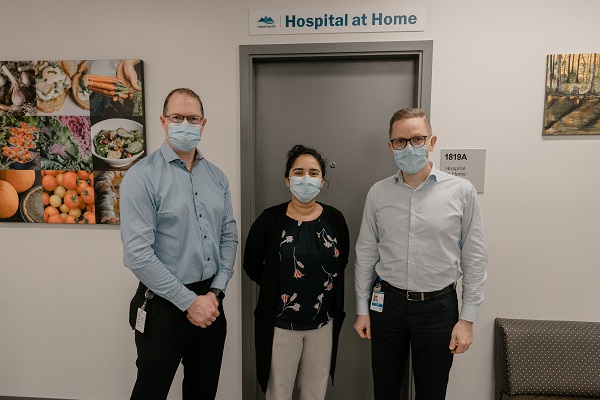By Dr. Sean P Spina & Dr. Curtis K Harder
The Hospital at Home model of care is putting a new twist on the old adage that “there’s no place like home.” Research shows that the best place for many patients to receive care is at home. Hospital at Home (HaH) is an innovative model of care that uses a suite of health technologies to provide safe, effective hospital-level care and services to people in their own home. Through a combination of in-person and virtual visits, patients are “admitted” to the hospital, and remain under the care of a hospital physician, nurse, dietician, clinical pharmacists and other healthcare providers. Island Health has implemented a one-program, two-site prototype at the Victoria General Hospital and Royal Jubilee Hospital in Victoria, BC. While similar programs have been implemented successfully in other countries, it’s a novel concept in Canada. This is also the first program with dedicated hospital clinical pharmacists embedded in the care team.
The HaH model leverages the specific benefits pharmacists provide in the inpatient care model. Pharmacists have become widely recognized as patient advocates and knowledge translators. In their role as patient advocate, pharmacists are particularly attuned to the potential risk involved in transitions in care, and they are able to navigate the complexity of medication systems to ensure patients stay safe. Clear communication with patients, caregivers, and the healthcare team is critical in the acute care context, and this is further heightened when care is delivered at a distance. Pharmacists have always had to be skilled in adapting their communication style to specific patient needs. HaH has now introduced a new context and new communication modalities (e.g., virtual care). With their longstanding experience in presenting complex information in understandable terms, pharmacists are particularly well suited to ensuring that patients and their families understand what they need to know about their medication regimens, especially at a point in care when changes (e.g., dose increases or decreases) are often essential.
When HaH was proposed as a model of care for implementation in Victoria, BC, our first questions were: “How are we going to evaluate impact of the program? How do we know that pharmacists are making a meaningful contribution?” A pharmacy-led Island Health research team, in collaboration with an Island Health internal evaluations team, are studying whether the program prototype is safe and convenient for patients and clinicians, and whether HaH is an effective and sustainable alternative to hospital-based care. We are developing a research study titled “INvestigation of the impact of a Pharmacist in a Hospital At Home Care Team” (IN PHACT) to specifically assess the impact of the pharmacist role on the HaH.
At the outset, we needed to ensure that in building the program in a Canadian context, we were meeting the needs of all stakeholders, including patients, family caregivers, health system decision makers, and clinical staff. We engaged patients and family caregivers as partners in the development of both the program and the evaluation framework, and we implemented a broad public engagement strategy consisting of a public survey and key informant interviews to hear from people across the health service spectrum that would be impacted by Hospital at Home.
As a direct result of feedback from these partners, we implemented a virtual call bell, enabling patients to reach a member of their care team remotely at any time, at the push of a button. We also implemented a comprehensive communication platform to ensure that patients and family caregivers are easily able to contact their care team for support. Even small changes, such as increasing the font size on instruction sheets and sanitizing hands in front of patients, are improving the experience of patients and family caregivers in the program. We have also been able to develop an evaluation framework grounded in patient and family caregiver priorities; we’re ensuring that we measure and report on outcomes and experiences that matter to them, in addition to the outcomes that are important to clinicians and decision-makers.
A less tangible but no less critical impact has been an incremental shift in organizational culture. By inviting patients and families to the table and valuing their input, there has been a shift toward collaboration, inclusivity and respect, and a greater understanding of the value that patient and family caregiver partners bring as experts on their own experiences.
For more information please follow our journey on our Island Health HaH webpage or Dr. Spina’s webpage or email us at HaHEvaluation@VIHA.CA.
Dr. Sean P Spina is the Principal Investigator for ATHOME, Co-Lead – HaH Evaluation, the Clinical Coordinator – Pharmacy Services, Royal Jubilee Hospital, Victoria, BC, an Adjunct Assistant Professor – University of Victoria, Health Information Sciences, and a Clinical Associate Professor, Faculty of Pharmaceutical Sciences, University of British Columbia. Dr. Curtis K Harder is Clinical Coordinator, Pharmacy Services, Victoria General Hospital and Clinical Assistant Professor, Faculty of Pharmaceutical Sciences, University of British Columbia.




